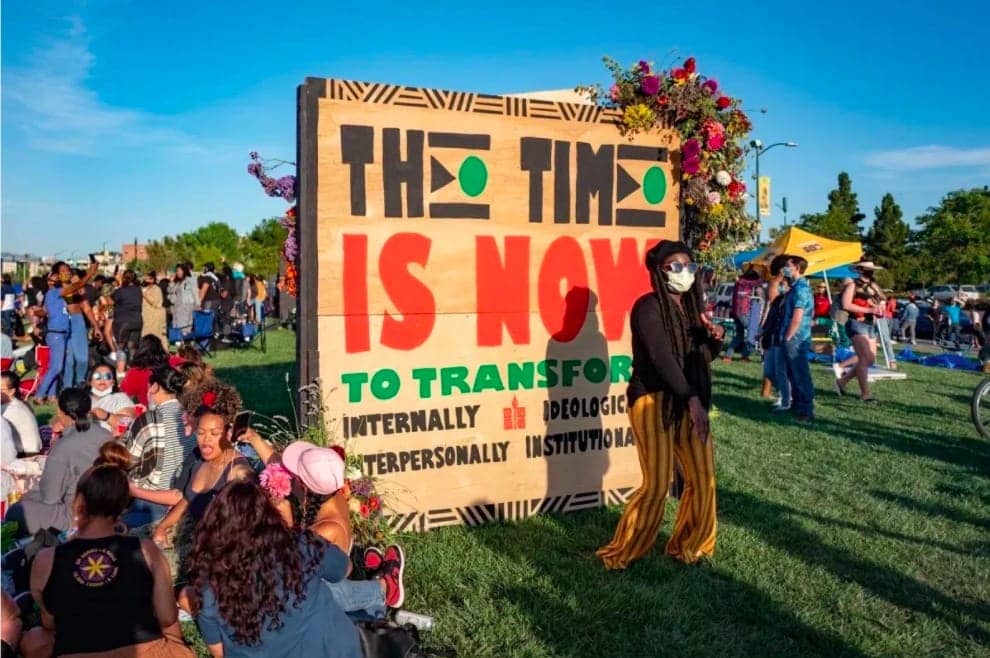
by Kheven LaGrone
Last year, thousands of young people celebrated Juneteenth at Lake Merritt. It was a beautiful moment. I knew this year would be even better since Juneteenth became a federal holiday only a couple of days earlier.
So, I went to Lake Merritt in Oakland early Juneteenth afternoon. There were multiple events around the lake. Ten thousand Black people came together to celebrate their history, culture – and themselves.
I walked around videotaping the day. People enjoyed each other. I saw no incidents and it felt like a safe place. I was cautiously optimistic that it would end wonderfully.
I was happy that no one person was acting crazy. That one person could take away thousands of people’s feelings of safety. Because it was a Black celebration, the world might stereotype Black people in general as violent and pathological. I could be stereotyped as well.
Suddenly, crowds of people started running past me. I asked some people why they were running? “It’s a shootout,” they told me. I hoped they were wrong. Perhaps someone had lit some firecrackers.
When we got a distance away, we stood around and speculated about what had happened. We were angry and disappointed. Someone violated our safe space for celebrating our Black history and culture. Then we talked about being penalized for the shooting.
“This was supposed to be a special moment for all of us; instead, they ruined the moment for everyone,” one woman said. “The white people over here are already trying to get rid of us. Now they have an excuse,” her friend added.
Most of us had come to enjoy the day. We did not come to shoot. This was not our fault.
“Just because of them, the city won’t let us have this celebration again,” another added. “Black folks can’t have nothing good without somebody messing it up for everybody,” she said.
We didn’t know exactly what happened. Still, we were stressed for being penalized. This understandably brought our spirits down. But I told them repeatedly not to take responsibility for the shooting. Most of us had come to enjoy the day. We did not come to shoot. This was not our fault.
They agreed. However, they still talked about being penalized. That was unfair to us. I even noticed that people were more agitated as they tried to leave. Since the streets were narrow and they were all leaving at the same time, they were stuck in traffic jams.
Earlier, those traffic jams had been part of the partying; now people got frustrated. One girl got out of her car to confront another. Her friends got out the car to join her. Another time, I heard a girl on her phone say that she and her friends had jumped some other girl at the celebration.
Eight people had been shot; one died. Their ages ranged from 16 to mid-60s. A 22-year-old man died. The shootings, not the celebration, made national news. One Sacramento television station called it a Black v. Black riot.
The Oakland police chief held a press conference and immediately racialized the shooting.
People commented on the online news. Not only did the commenters hold Black people at the event “guilty,” they blamed Black people in general and all over the country for the shooting. They blamed celebrating Juneteenth. They blamed making Juneteenth a federal holiday.
On Monday, June 21, 2021, the Oakland police chief held a press conference where he talked about the shooting. He immediately racialized the shooting. Such violence, he said, disproportionately affects African Americans in Oakland.
Then, the police chief tried to make clear that the negative people did not define the celebration. For example, he recalled that when the ambulance came to attend to the injured people, people danced around it. This prevented the ambulances from getting to the injured people. But the chief recalled that more people stood up and made a way for the ambulance get through to the injured people. Many people also came to the aid of the injured people while waiting for the ambulance. These Black people would not be acknowledged in the media.
A reporter at the press conference asked about distress caused by the shooting. I didn’t deserve to have my safe space violated. I didn’t deserve to be stereotyped as violent. That is stressful.
Kheven LaGrone, investigative reporter, activist, writer, artist and curator, can be reached at kheven@aol.com. He is also a licensed civil engineer.





